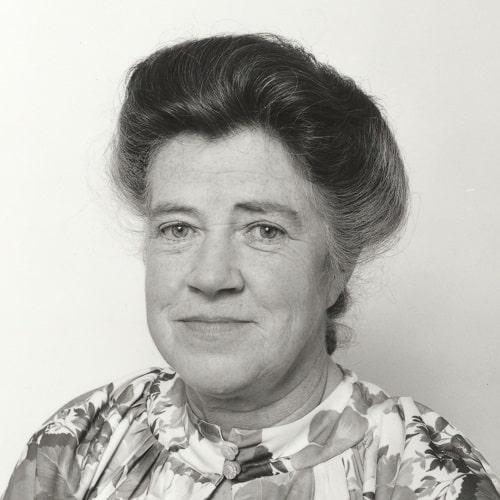Dame Barbara Evelyn Clayton was a professor of chemical pathology at Great Ormond Street Hospital (GOSH) for much of her career and, during this time, made several major contributions to child health. Born in Liverpool, she was the daughter of William Clayton, a food scientist who is credited with inventing salad cream, and his wife, Constance Evelyn née Caine, whose father, Thomas Joshua, was a businessman. Educated at St Nicholas Preparatory School in Orpington and Bromley County School for Girls, she studied medicine at Edinburgh University and the Edinburgh Royal Infirmary.
Qualifying in 1946, she was house physician to Sir Stanley Davidson [Munk’s Roll, Vol.VII, p.136] for a year. Passionately interested in research, she then became a research assistant at the Medical Research Council clinical endocrinology unit in Edinburgh, where she was awarded a PhD in 1949 for her work on oestrogens. The same year she moved to London to be Holden research fellow at St Thomas’s Hospital Medical School until 1956, when she became lecturer in chemical pathology at St Thomas’s. While there her research on hormones with new biochemistry techniques brought her much justified recognition.
In 1959 she was appointed consultant in chemical pathology at GOSH and, additionally, professor of chemical pathology in 1970. Changing her previous work in endocrinology, she now concentrated on solving the problems of babies born with genetic metabolic disorders. By the introduction of new microchemistry techniques, she developed a test to diagnose phenylketonuria (PKU) using tiny blood samples instead of the large amounts previously required. All midwives now take a tiny pinprick of blood from a newborn baby’s heel and, if the child has PKU, it is immediately put on a special diet – that Clayton devised – which prevents otherwise inevitable brain damage.
Her experience working with the dieticians at GOSH on PKU sparked a general interest in paediatric nutrition and toxicology. Concerned by the high levels of lead she observed in children’s blood, she published (with five others) ‘Lead poisoning in children’ (Arch dis child 1964, 39, 1-13) and campaigned hard, when a member of the Royal Commission on Environmental Pollution in the 1980s, to make sure that the government enforced a ban on lead in petrol, paint and other products.
After the sudden death of her husband, she moved to the new medical school at the University of Southampton in 1978 as professor of chemical pathology and human metabolism (its first female professor) and honorary consultant chemical pathologist at the university hospital. From 1983 to 1986 she was also dean of medicine. Appointed emeritus professor in 1987, she continued her work on nutrition, this time looking at the needs of the elderly, particularly those in care homes, about which there was little information.
The author of over 200 research papers, she also served on more than 30 expert committees, several of which she chaired. President of the Royal College of Pathologists, the British Nutrition Foundation, the Association of Clinical Biochemists, the Biomedical Sciences Section of the British Association for the Advancement of Science, the Society for the Study of Inborn Errors of Metabolism, the National Society for Clean Air and Environmental Pollution, the British Dietetic Association, the British Nutrition Foundation, she was also chair of the medical/scientific panel of the Leukaemia Research Fund.
In 1988 she was made DBE for services to medicine and, in 1999, was awarded the British Medical Association’s gold medal for distinguished merit and became an honorary fellow of the Institute of Biology and the Royal College of Paediatrics and Child Health.
She was asked to chair the Lowermoor enquiry in 1989 into an incident in which the drinking water in Camelford, Cornwall was contaminated by a high concentration of aluminium sulphite mistakenly put in the wrong tank. Before the water authority discovered what had happened, people were encouraged to continue drinking the water. All Clayton’s ability as a natural diplomat was called upon as she dealt with a hostile response from local people when she tried to ascertain if the medical symptoms they described could be attributed to the poisoned water.
A sociable and hospitable person, she enjoyed the company of her family, the study of natural history and spending time in her Dorset cottage.
She met her husband William Klyne (‘Bill’) when she was researching for her PhD in Edinburgh and they married in 1949. He was the son of Carl Adolphe Klein, a research chemist. A distinguished steroid chemist, Klyne became professor of chemistry at London University. He died in 1977 and their children, Michael and Jane, survived her.
RCP editor
[University of Southampton news www.southampton.ac.uk/medicine/news/2011/01/09_dame_barbara_clayton.page; The Lancet www.thelancet.com/journals/lancet/article/PIIS0140-6736%2811%2960564-3/fulltext; The Guardian www.theguardian.com/science/2011/mar/06/dame-barbara-clayton - all accessed 30 July 2015]

